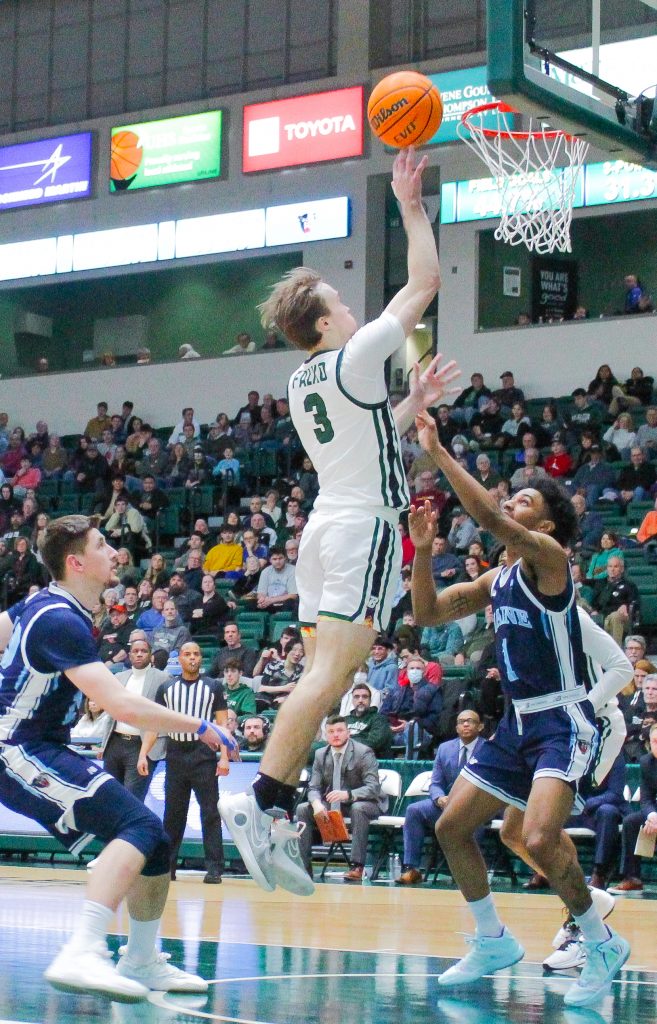On Tuesday, the Binghamton men’s basketball team traveled to Burlington, Vermont looking to advance to the America East (AE) Championship final and overcome the regular season’s top seeded squad. The Bearcats looked to get their revenge and flip the script against the Catamounts after being defeated 74-42 in last year’s AE semifinals, as well as dropping both regular season contests to them this year. However, Binghamton would fall short as UVM cruised to a 79-57 victory, ultimately ending BU’s season.
“I thought we had a good game plan, especially defensively,” said Binghamton head coach Levell Sanders. “I thought we were going to be able to guard [Vermont]. We had an emphasis on taking away their 3-pointers, and I know [Vermont senior guard Dylan Penn] hit 3-pointers, but that wasn’t his strong suit. He hasn’t done that all year, so his threes are not something that we thought hurt us that bad. They only made, as a team, five threes and in all of their losses they had five threes or less, so we thought if we held them to that number we’ll be good.”
In the opening half of the semifinal matchup, both the Bearcats (13-18, 8-8 AE) and the Catamounts (22-10, 14-2 AE) began competitively as BU remained close despite being unable to grab a lead. A pair of 3-pointers from senior guard Jacob Falko and junior guard Armon Harried kept Binghamton in pursuit, despite a two-for-nine shooting start with six turnovers in the opening 10 minutes, leaving the visitors trailing 12-10.
As first half play continued, Vermont found an opportunity to grow its lead over BU and didn’t let up. An 18-4 run, one which left Binghamton scoreless for five minutes, saw UVM catapult ahead to a 30-14 lead. The Bearcats found their shooting form again before halftime through efforts from senior guard Dan Petcash and graduate student forward Miles Gibson, but with the half being called shortly after, the visitors still trailed the Catamounts 39-18.
“The one thing that I thought we would have issues with was scoring,” Sanders said. “And that’s just because we’re not a great shooting team, and so what a lot of teams do to us is they clog the paint, and they force us to shoot from outside. And when we don’t have an opportunity to score in the paint, we struggle to score just because we don’t shoot that well from outside — nine-[for]-21 from three — Definitely disappointed that we didn’t get a chance to win the game and play a little bit better, but I thought we fought and we did as much as we could to get a W.”
Coming out of halftime, Binghamton got on the board first. Falko was sent to the line and drilled two free throws, making the score 39-20. Despite being down big, the Bearcats began to trade baskets with Vermont. Although Binghamton struggled to cut into the hosts’ lead and gain any significant momentum, the visitors began to move the ball and hit some shots.
Halfway through the period, the Bearcats found themselves down 59-36 as they were unable to make a significant dent in Vermont’s lead. Both teams exchanged baskets for the rest of the half as the Bearcats could not find a way to go on any significant runs. Despite shooting nearly 54 percent from the field and shooting 7-13 from beyond the arc in the second half, Binghamton could not stop Vermont’s offense as the Catamounts made 64 percent of their field goals and outscored BU 40-39 in the period.
“I just think that Vermont [is] a really good first half team, and when you’re up by 20, you kind of lose a little focus,” Sanders said. “I thought we made some baskets late, it was 39-40 in the second half, but a lot of our baskets came late. [Falko] had a lot of late threes, so that number can be a little bit deceiving. I thought we had some shots that we didn’t take — when you play against a good team and you have shots, you’ve gotta take them and we didn’t do that. And I thought we became hesitant, a little passive.”
Binghamton finished the season 8-8 in conference play — the program’s best conference win percentage since the 2009-10 season. Despite enduring the same outcome in the AE semifinals against Vermont for the second year straight, Sanders feels that the program is heading in a successful direction.
“I thought our season was kind of up and down,” Sanders said. “I thought in the first part — the nonconference season — adding the new guys that we added, I felt that we were trying to find a rhythm. And then I thought once conference season came around, we kind of tweaked some things and found a lineup. We started playing small-ball and found a lineup that really worked for us. I thought that really kind of gave us the opportunity to play some better basketball. We ended the season losing four games in a row, two games went into overtime. So overall, we’ve had eight conference wins, finished 500 in the league, which we haven’t done in a long time. We had 13 wins overall, so I think overall the program is on a good trajectory … I think we’re going in the right direction and if we keep with this pace, we’re going to become a really dangerous team and will be competing for championships in years to come.”



